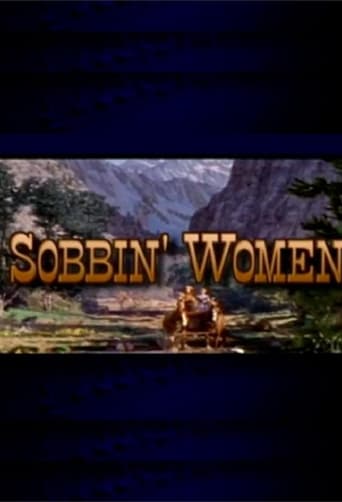



I cannot think of one single thing that I would change about this film. The acting is incomparable, the directing deft, and the writing poignantly brilliant.
View MoreAt first rather annoying in its heavy emphasis on reenactments, this movie ultimately proves fascinating, simply because the complicated, highly dramatic tale it tells still almost defies belief.
View MoreEach character in this movie — down to the smallest one — is an individual rather than a type, prone to spontaneous changes of mood and sometimes amusing outbursts of pettiness or ill humor.
View MoreExactly the movie you think it is, but not the movie you want it to be.
View More"Sobbin' Women" (1997) Is The Best Documentary About A Classic Hollywood Musical Ever Made By Far."Seven Brides For Seven Brothers " (1954 MGM) starring Jane Powell and Howard Keel was originally filmed in 1953, was made "inexpensively" (cost was about 1/3 that of "Brigadoon" released in 1953 starring Gene Kelly), and was not expected to be a big hit or a major movie.Well, you just never know, eh? 55 years later, in 1997, about a dozen of the major players part of this truly "ensemble" movie were gathered and interviewed for this incredible documentary about the making of "Seven Brides For Seven Brothers" (1954 MGM), with scenes from the actual movie inter-cut between interviews of the now "senior citizen" characters.Almost all were quite young when the movie was made in 1953 (e.g. Producer Stanley Donen was 27 years old in 1953, most of the Brides and Brothers were in their 20's and several were in their teens..."brothers" Russ Tamblyn, Jacques D'Amboise, and "bride" Ruta Lee were all teen agers.....the only "older" actor/ dancer in the movie was Ballet Russe veteran dancer Mark Platt was 41 in 1953....the oldest major cast member of all by far, and still living in 2012 at age 98!).Nobody who treasures major Hollywood musicals over history should miss this documentary about one of the best musicals ever made at any time.The story the documentary film tells is riveting, and so are the people.Actresses who played "brides" are interviewed, and several (Julie Newmar and Ruta Lee) are still spectacular, movie star level beauties in 1997 with astonishing ability to compel attention with their words, their simple gestures, and their still breathtaking pulchritude....that means beauty from the Latin word "pulchra," which means beautiful!).Michael Kidd created the dances for the movie, and is interviewed during the documentary. He didn't see, originally, how the movie could be a dance movie at all....originally planned only to "stage" the singing segments without actual and formal dancing.All this changed, and the movie became one of the great dance movies of all time.You just never know, do you? The entire movie was shot in only 47 days....."inexpensive" movies in the present era (2012) are shot in that amount of time.The famous "barn dance" sequence was shot in only 3 days after about 4 weeks of rehearsal.The "wood cutting" song and dance sequence (set at the brothers' farm outside in the snow, sung by the lonesome brothers who miss their girlfriends and future brides, and sing of their loneliness while swinging axes and sawing wood on their farm) was shot without a single cut. The entire sequence was done in one take without turning the camera off. Very fancy filmmaking.Two entirely different versions of the movie were shot, one in widescreen "Cinemascope" and another in conventional 35 mm film.Two entirely different performances were given by the movie's actors and dancers. Two entirely different filming's of the movie were created by the technical staff. Enthusiasts interested in "Seven Brides" will interested to view and compare the two versions (both are available on the 50th Anniversary 2004 DVD release of the movie, along with the "Sobbin' Women" documentary.....which is not sold separately, sadly).The later is almost never seen or shown. The "non-wide screen" version available on most videos of the movie is taken from the Cinemascope version. The "conventional aspect ratio" version was meant to be shown in movie houses not equipped with wide-screen, Cinemascope lenses, since Cinemascope was only introduced into USA movie theaters the year "Seven Brides" was filmed (1953).Both the "Sobbin' Women" documentary and the "second and completely separately shot" version of "Seven Brides" in the "conventional aspect ratio version" are available in a DVD package released in 2004, the 50th anniversary of the the release of "Seven Brides For Seven Brothers" (1953 MGM).The "Sobbin' Women" (1997) documentary about "Seven Brides" and how it was made as told by "players" who were there is so good, it should be sold separately, made available for sale as a separate item.Currently (2012), it appears the documentary is available only by purchasing the 2004 DVD "50th Anniversary" release of the movie in both the wide-screen, and the separately shot (and performed) conventional aspect ratio version.There are so many good things about the "Sobbin' Women" (1997) documentary, it is hard to list them all, remember them all.If is a treasure. Get it. Keep it. Screen it often! -------------Written by Tex (David) Allen. Visit WWW.IMDb.Me/TexAllen for more information/ biography background about Tex Allen, email him at TexAllen@Rocketmail.Com.
View MoreHaving enjoyed watching the Seven Brides a Brothers often, I've noticed that the girls that each of the Brothers had chosen at the barn raisin' were not always their dancing partner. But the red-hair and colored shirts, that was brilliant. Bravo!Did you notice that all the girls were singing, upstairs in their bloomers and outdoors in the spring? Each of the girls, including Millie, sang a solo bit, all except Alice. And the Brothers...? Well, see for yourself.I wonder. Thirteen in the wagon being pulled by four horses through Echo Pass. That was filmed on site, right? Great!
View More